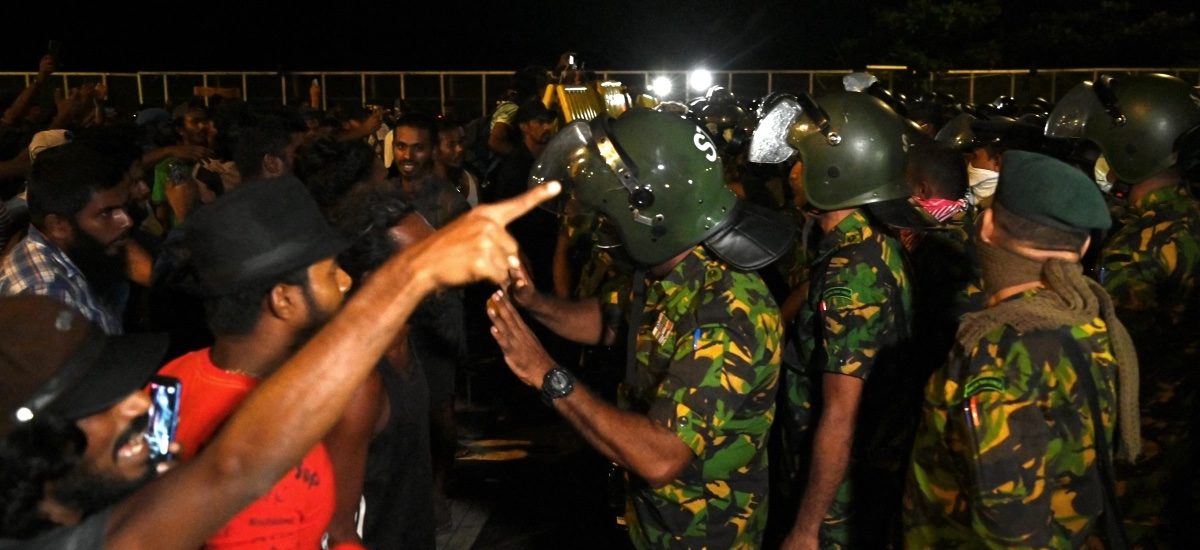Photo courtesy of Al Jazeera
From all parts of the country, there are reports of arrests of people who participated in the protests that erupted against the hardships caused by the economic meltdown. For months people made their voices heard about the unbearable living conditions that they faced. Since the government and the authorities were indifferent to their grievances, a spontaneous movement of protest arose, first from the farmers and agricultural workers, which spread into all sectors of society. The government and the political establishment were shaken by the extent of the massive dissatisfaction and, to suppress the expressions of this dissatisfaction, large scale arrests are taking place throughout the country, enabled by the declaration of emergency.
Journalists and media personnel are a top priority in the arrests, which are not on the basis of any illegal acts committed by media personnel; they are being targeted for providing information to the people. Thus, belonging to the free media is considered an offence when in fact the law protects the right to freedom of expression as a fundamental right recognized by the constitution. However, emergency laws are being used to override the constitution itself.
The second group that has been targeted are trade unionists and people involved in movements that protect the rights of people. The right of association is also recognized as a fundamental right in the constitution and it is necessary for the maintenance of a free and civilized society. Students are particularly targeted with several reports of arrests and detentions.
As it has happened previously, emergency laws are being used by the ruling party to suppress their political opponents to gain an electoral advantage.
There will be more victims of illegal arrests because emergency laws are made use of by people to have their opponents arrested, detained and otherwise dealt with. Sri Lanka has a notorious habit of the submission of fake petitions to the authorities. An example is the case of the Embilipitiya children who were killed inside a military camp because of a personal issue. This kind of false complaint can happen on a large scale and lead to serious repercussions for victims and their families.
Arrests during times of unrest are not directed only at those who are being arrested; the real target is the population itself. The idea of large scale arrests and detentions, which can lead to torture and enforced disappearances, is to intimidate society as a whole. This is an universally known tactic of preventing people with grievances from expressing their protests openly; silencing the masses who are faced with grave economic and other difficulties is a task that the authorities try to achieve by various techniques of intimidation.
One such tactic was explained by Joseph Stalin’s prosecutor, Andréy Vyshínskiy. In the 1930s, when the Moscow trials were taking place, Stalin’s prosecutor explained that the concern had not been about the particular individuals who were being prosecuted. Whether they were guilty or not was not a matter of concern. The target was the population. The population needed to be taught what to think and how to behave in a way that would not contradict the objectives of the government.
The people who were driven to protest in Sri Lanka were those who faced shortages of food, medicine, cooking gas and fuel and had problems relating to their children’s education. The government had no strategy to resolve the difficulties. Parents who complain about malnutrition in their children become enemies of the state. Whatever their suffering, they should learn to keep quiet. If they make too much noise or participate in protests, they will be jailed.
Unless the government abandons this policy of repression, illegal detentions and other forms of repression such as torture and enforced disappearances will become inevitable.
A government that is unable to resolve genuine problems of the people needs to be humble. It should discuss its weaknesses and try to address the most acute problems such as malnutrition and hunger and shortages of medicine and essential services. Above all, the government should approach the active members of society with a cooperative spirit, admitting the problems that it is faced with and discussing possible solutions and the sacrifices that people will have to make.
However, the sacrifices must be equally distributed. If higher income groups are being spared and if the sacrifices are thrust on the poor, then the government will need to silence protesting voices with arrests and detentions. If the government goes down that path, it will create an unstable society. In pursuing a policy of arrest, detention and repression, the government is following a dangerous path for society and also for itself.


